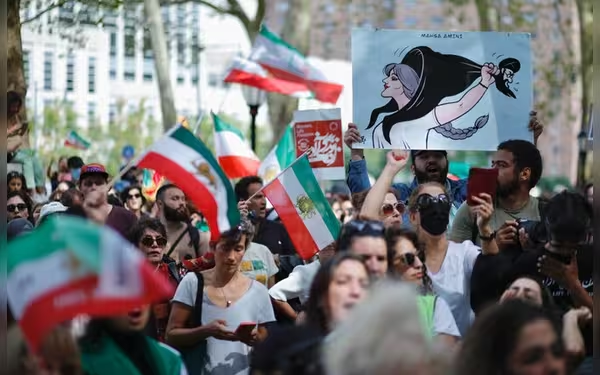Saturday, November 16, 2024 07:29 PM
Iran Supreme Court Overturns Death Sentence for Labor Activist Sharifeh Mohammadi
- Iran's Supreme Court annuls death sentence for Sharifeh Mohammadi.
- Mohammadi was accused of ties to a Kurdish separatist group.
- Her case highlights ongoing human rights concerns in Iran.
 Image Credits: arabnewspk
Image Credits: arabnewspkIran's Supreme Court has overturned the death sentence of labor activist Sharifeh Mohammadi, raising hopes amid ongoing human rights concerns.
In a significant legal development, Iran’s highest court has recently overturned the death sentence of a prominent woman labor rights activist, Ms. Sharifeh Mohammadi. This decision comes amidst ongoing concerns regarding human rights practices in Iran, particularly related to the treatment of activists and dissenters. Mohammadi was accused of having ties to an outlawed Kurdish group, which has raised alarms among various human rights organizations.
According to local media reports, her lawyer, Amir Raisian, confirmed that the Supreme Court has annulled the previous verdict against her. He stated, “The Supreme Court... has overturned the verdict against my client, Ms. Sharifeh Mohammadi.” This ruling means that her case will now be sent back for a re-trial, offering a glimmer of hope for her supporters and advocates of labor rights.
Mohammadi, who is 45 years old, was sentenced to death in early July after her arrest in the northern city of Rasht. Rights groups have indicated that she was accused of being a member of the Komala party, a Kurdish separatist group based in Iraq, which the Iranian government labels as a terrorist organization. This classification has been a point of contention, as it often leads to severe penalties for those associated with such groups.
The backdrop to this case is the broader context of unrest in Iran, particularly following the tragic death of Mahsa Amini in September 2022. Amini, a 22-year-old Iranian Kurd, died in custody after being arrested for allegedly violating the strict dress code imposed on women in the Islamic Republic. Her death sparked widespread protests across the nation, highlighting the growing discontent with the government’s policies and treatment of women.
Iran is known for having one of the highest rates of executions in the world, second only to China, according to various rights organizations, including Amnesty International. The Iranian government employs capital punishment for a range of serious offenses, including terrorism, murder, drug trafficking, and sexual crimes. This harsh approach to justice has drawn international criticism and raised questions about the fairness of trials and the treatment of defendants.
As the case of Sharifeh Mohammadi unfolds, it serves as a reminder of the ongoing struggle for human rights and justice in Iran. The overturning of her death sentence is a crucial step, but it also underscores the need for continued vigilance and advocacy for those who dare to speak out against oppression. The world watches closely, hoping for a future where justice prevails and the rights of individuals are respected and upheld.













